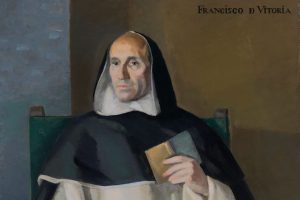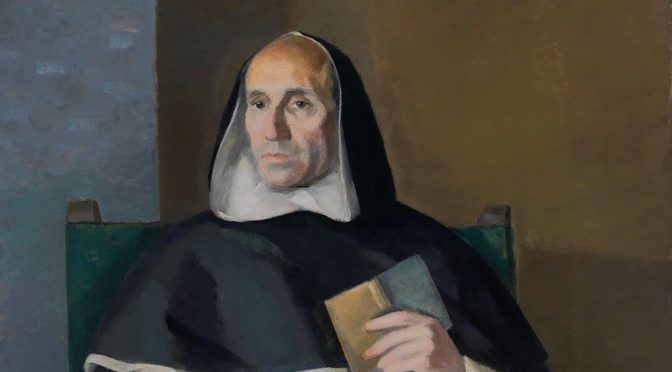At at time when Spain was colonizing the Americas, there were many moral questions that came with exploiting the Native populations and their lands. One prominent voice against Spain’s actions was Francisco de Vitoria. Sometimes called a father of international law (though modern scholars would argue it wasn’t truly international law as we think about it today), Vitoria worked to define what justified war and when Spain could legitimately use force against the Natives of the Americas. His ideas, along with those of his contemporaries, helped to define the relations between nations.

- It isn’t clear where Francisco de Vitoria was born. Some references say Burgos, others say he was born in Vitoria, Araba. It also isn’t clear when he was born – maybe 1483, maybe 1486, maybe as late as 1492-93. Regardless, his father Pedro de Vitoria was from Araba. His mother, Catalina de Compludo, was from a noble family, just like his father. A native of Burgos, she had Jewish ancestry.
- In 1504, Vitoria became a Dominican, studying at least some of the time in Paris. In 1516 he started teaching himself, returning to Spain to teach in Valladolid in 1522. In 1524, he was elected chair of theology of the University of Salamanca. He would spend the rest of his life in Salamanca, in the Dominican monastery of San Esteban.
- It was in Salamanca that Vitoria really established a name for himself. In 1538-39, he wrote a treatise on the legality/illegality of war and what would justify war. Vitoria expanded upon ideas developed by Thomas Aquinas, arguing that the only times war was justified were against aggression or to right a great wrong. He said that innocents should only be harmed when it was impossible to distinguish them from combatants. He also said that if one’s conscience said that the war was wrong, he or she should not participate.
- He also wrote, after being consulted by the king of Spain, on the status of the Native Peoples of the Americas. He argued, based on the ideas of the dignity of man, that the Natives were not slaves, that they had rights to their property, and that Spain was violating their rights. He also argued that they should not be forcibly converted to Christianity. In his view, Spain had not satisfied the conditions for just war.
- He also made significant advances in the classroom, requiring students to take notes at a time when this was not the norm. His teaching style was widely recognized and spread to other institutions of learning. In the end, some 5000 students passed through his classroom.
A full list of all of Buber’s Basque Facts of the Week can be found in the Archive.
Primary sources: Estornés Zubizarreta, Idoia. VITORIA, Francisco de. Auñamendi Encyclopedia. Available at: https://aunamendi.eusko-ikaskuntza.eus/en/vitoria-francisco-de/ar-129022/; Francisco de Vitoria by Bernice Margaret Hamilton, Britannica; Francisco de Vitoria, Wikipedia
Discover more from Buber's Basque Page
Subscribe to get the latest posts sent to your email.


